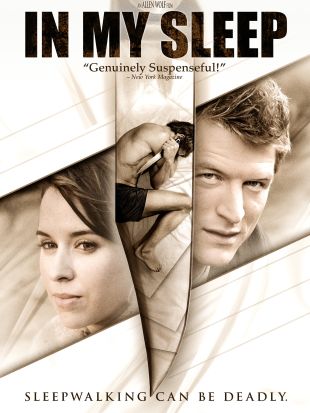
Tyro writer-director Allen Wolf's thriller In My Sleep has a terrific premise, if not a completely original one. It recalls Dean Koontz's 1990 best-seller The Bad Place in its tale of a parasomniac -- an individual who not only sleepwalks, but regularly commits a series of nocturnal actions that he cannot remember the next morning, and naturally becomes implicated in a homicide.
Philip Winchester stars as Marcus, a bleached-blond, barrel-chested Southern California masseuse with a Calvin Klein model's face, who spends much of the film strutting around with his shirt off; he resembles nothing so much as a body-waxed Ken doll. He's been saddled with parasomnia since childhood, but concludes that it has recently grown worse, especially after he apparently sleeps with a friend's sexy wife while out of it -- and wakes up to find her dead. That's the movie's setup.

Above all else, the greatest potential draw of the film's premise should be its ability to pull us into the loss of control that Marcus experiences on a regular basis -- after all, what could be scarier than a sane person, with whom we fully identify, realizing that he may have insane spells during which he commits homicidal acts? But the level of empathy needed to make this work never once arises from the film. In fact, the opposite is true -- we feel distanced from Marcus from the beginning. Wolf and co. feebly try to make this lead character sympathetic, but (especially in the early stages of the film) he comes across as sleazy, arrogant, and unctuous; for instance, when an upset young woman phones him to complain that he abandoned and forgot her after a pickup, he shoots back with, "Awww. How could I forget a voice as beautiful as yours?" This womanizer's central defining characteristic is a pathological addiction to casual sex -- an addiction so strong that Marcus has to go to nymphomaniac group therapy to stave off his inner lusts. This sets up some unintentionally hilarious moments ("Hi... my name is Rob, and I'm a sexaholic.... This week, I watched a lot of porn...") that destroy whatever potential for tautness this movie had during its inception.
Unfortunately, the ludicrous scenes don't begin and end with the group meetings -- they are scattered endlessly throughout the film and have to be seen to be believed; seldom has a thriller suffered from so many miscalculations. Marcus' girlfriend (Lacey Chabert) waltzes into his flat for a casual visit, inexplicably whips a green feather duster out of her purse, and begins to dust the apartment while making small talk. The protagonist cuts into a steak and hallucinates that black blood is gushing out. Another character beats the hell out of Marcus and kicks him in the stomach repeatedly; then, Marcus suddenly acts as if nothing has occurred, leaps to his feet energetically, and athletically dives into a swimming pool, unfazed. Marcus is seduced by a female client during a massage session; she props herself up, grabs his hand and runs it over her naked body. The list goes on and on. The dialogue is also full of howlers; in one of the most inspired moments, a female detective (Amy Aquino) waltzes up to Marcus and muses, "You know what I love about sunflower seeds? You have to bite them at just the right angle... to suck out all the good stuff."

The ludicrousness of the erotic scenes, such as the masseuse client sequence, points to the film's complete disconnectedness from any sort of recognizable reality. Marcus and his pals seem to exist in some sort of sun-drenched fantasy land. Their environment and the flat, dull way that Wolf and DP Michael Hardwick shoot various scenes make the material look far better-suited for an episode of Baywatch or a USA Network after-dark telemovie than a theatrical release. Aside from some very charming supporting work by Chabert, the performances are uniformly horrendous -- weighed down by flat, wooden line readings that seem completely detached from the emotions guiding the scenes.
The film is narratively murky as well; one wouldn't be spoiling any surprises to note that bizarre details emerge about Marcus' childhood (partially conveyed via hallucinatory dream sequences), because they not only fail to contribute to the resolution of the story in any significant way, but make the movie far more confusing than it has to be. Wolf is obviously a student of Hitchcock, judging from the derivative Psycho-esque music on the soundtrack, and that's fine (there are occasions when the music works effectively enough), but unfortunately, he also seems to have inherited the Achilles' heel of Psycho -- the desire to provide a textbook, cut-and-dried explanation for the lead character's mental condition. Didn't Wolf realize that it would be even scarier if we couldn't account for the clinical origins of Marcus' parasomnia?
In the final analysis, one cannot escape the sense that the writer-director ran into a creative block when trying to dream up narrative possibilities associated with parasomnia itself, and tried to cloud that limitation with a host of convoluted tangential elements -- the nymphomania, the flashbacks to childhood, the surrealistic nightmare sequences -- that bear little relevance to the central premise and strike one as attempted distractions from the ham-handed amateurishness at the movie's core.
